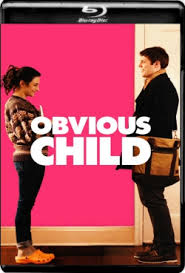
OBVIOUS CHILD
US, 2014, 88 minutes, Colour.
Jenny Slate, Jake Lacey, Gaby Hoffmann, Richard Kind, Polly Draper, David Cross.
Directed by Gillian Robespierre.
The title of this film comes from a song by Paul Simon.
It is the story of Donna (Jenny Slate) who attempts to be a stand-up comedian. The film opens with her routines at a club, the personal story, the sexual and physical emphases.
In this brief film, we see various episodes in Donna’s life, relationship to her pleasant father, Richard Kind, to her rather superior mother, Polly Draper. She becomes involved in a one night stand with a pleasant young man, Max, Jake Lacey, who admires her performance. She does not expect to see him again but later discovers that she is pregnant. He also turns up a number of times, wanting to keep the contact with her, going out on a date. She resists him, even going out to the apartment of a sleaze at the club, played by David Cross.
She is uncertain about her life, working in a bookshop which is closing down, getting advice from various friends. Her pregnancy becomes the focus of the end with the decision to get an abortion. She has two weeks to consider the situation, trying to sort out things, but finally deciding to have the abortion. At the end, she has calmed down and is seen with Max, watching Gone with the Wind.
Her character has been criticised by number of bloggers, accusing her of complete self-centredness as regards the birth of the child.
1. The story of a stand-up comedian, the topics, physical and sexually oriented, relationship to her actual life? The humour, seriousness?
2. The title, from Paul Simon’s song? Meaning?
3. New York City, apartments, comedy clubs, restaurants, clinics? The songs, the score?
4. Donna, the introduction, her show, the range of jokes, focused on her vagina, bodily functions, feminine perspectives, feminist? Wry, the response of the audience? In the clubs?
5. Donna, the support of her friends, Natalie and her coming to support her? The gay friend and his chatter? Meals? At the bookshop, the owner, given notice, the woman at the shop, helping her? The sleazy man at the club, going to his apartment, the effect on her? Her age, experience, maturity?
6. The scenes with her parents, her father a nice man, separated, cooking spaghetti, conversation, making the puppets, supporting her? The mother, Professor, intellectual, offhand with human issues?
7. Donna, at the shop, her job, lonely and awkward, the ironies of her life? The chance encounter with Max, in the audience, talking, the one night, her waking up, leaving, the effect on her? Not expecting to see him again?
8. Her moods, the pregnancy tests, reactions, not telling people? Max, coming to the shop, seeing her in the box? Max returning her mother’s book and admiring her? Donna going to her mother, telling her, her mother’s offhand response? Max inviting her to dates, or avoiding them? Her performance on the stage, leaving, finding Max outside but going to the sleazy man’s apartment, his behaviour, her leaving?
9. Max, the reality of the situation, response?
10. The visiting the doctor, the two weeks, the request for the abortion, going to the clinic, the procedures?
11. The final sequence with Max, quiet, watching Gone with the Wind? What future?
12. The criticisms of the character of Donna, irresponsible, self-centred, deliberate and easy with deciding on the abortion?